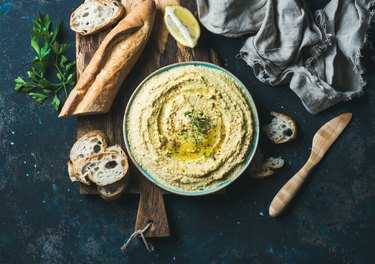
Though hummus is quite flavorful, it is unlikely to treat or prevent constipation — a common health problem. If you like hummus and are often constipated, you may be able to get some relief by pairing hummus with fiber-rich foods.
Constipation Basics
Video of the Day
Constipation — or infrequent or painful bowel movements — affects a large proportion of people in the United States. While constipation can be caused by various factors, inadequate fiber intake is often to blame.
Video of the Day
According to the American Society of Colon and Rectal Surgeons, healthy adults should eat at least 25 to 30 grams of dietary fiber each day, though most individuals consume only half of the recommended amount. Adequate water intake and regular physical activity are also important for those who want to prevent and treat constipation.
Hummus Basics
Hummus is a traditional Middle Eastern spread made from chickpeas, tahini paste, olive oil, garlic, lemon juice and a variety of herbs and spices. While you can eat hummus in a variety of ways, it is traditionally used as a dip for vegetables or pita bread. Though some people choose to make their own hummus at home, it is now widely available for purchase in most grocery stores in a variety of flavors.
Read more: 9 Healthy Hummus Dips Worth Making Yourself
Hummus Nutrition
Depending on whether hummus is homemade or store-bought, its fiber content — which affects the development of constipation, as well as its treatment and prevention — may vary.
In fact, 1 tablespoon of homemade hummus contains only 0.6 gram of fiber, while the same amount of commercially prepared hummus contains 0.9 gram of fiber.
Since one serving of hummus is equal to 2 tablespoons, you can expect to get 1.2 and 1.8 grams of fiber, respectively, in each serving of homemade and commercially prepared hummus.
Filling Up on Fiber
Pairing hummus with other nutrient-rich foods may be an effective way to increase fiber intake and help prevent or relieve constipation. Vegetables — such as raw broccoli — are often served alongside hummus and can contribute about 4 grams of dietary fiber in a 1-cup serving. Carrots, another popular vegetable to pair with hummus, will also provide almost grams of dietary fiber in 1 cup.
Whole-wheat pita bread, which provides about 5 grams of dietary fiber in one serving, is also a good addition to any hummus tray. So enjoying a snack of 2 tablespoons of hummus with broccoli, carrots, or whole-wheat pita may provide 5 to 7 grams of dietary fiber, which is 17 to 28 percent of your daily requirement.
- USDA National Nutrient Database: Hummus, Home Prepared
- USDA National Nutrient Database: Hummus, Commercial
- Harvard School of Public Health: Fiber: Start Roughing It!
- American Society of Colon and Rectal Surgeons: Constipation
- USDA National Nutrient Database: Broccoli, Flower Clusters, Raw
- USDA National Nutrient Database: Pita, Bread, Whole-Wheat